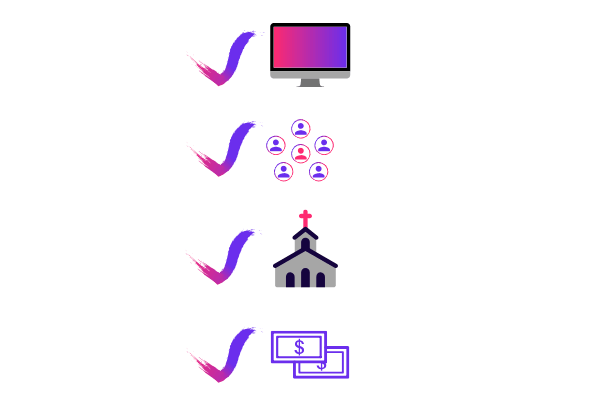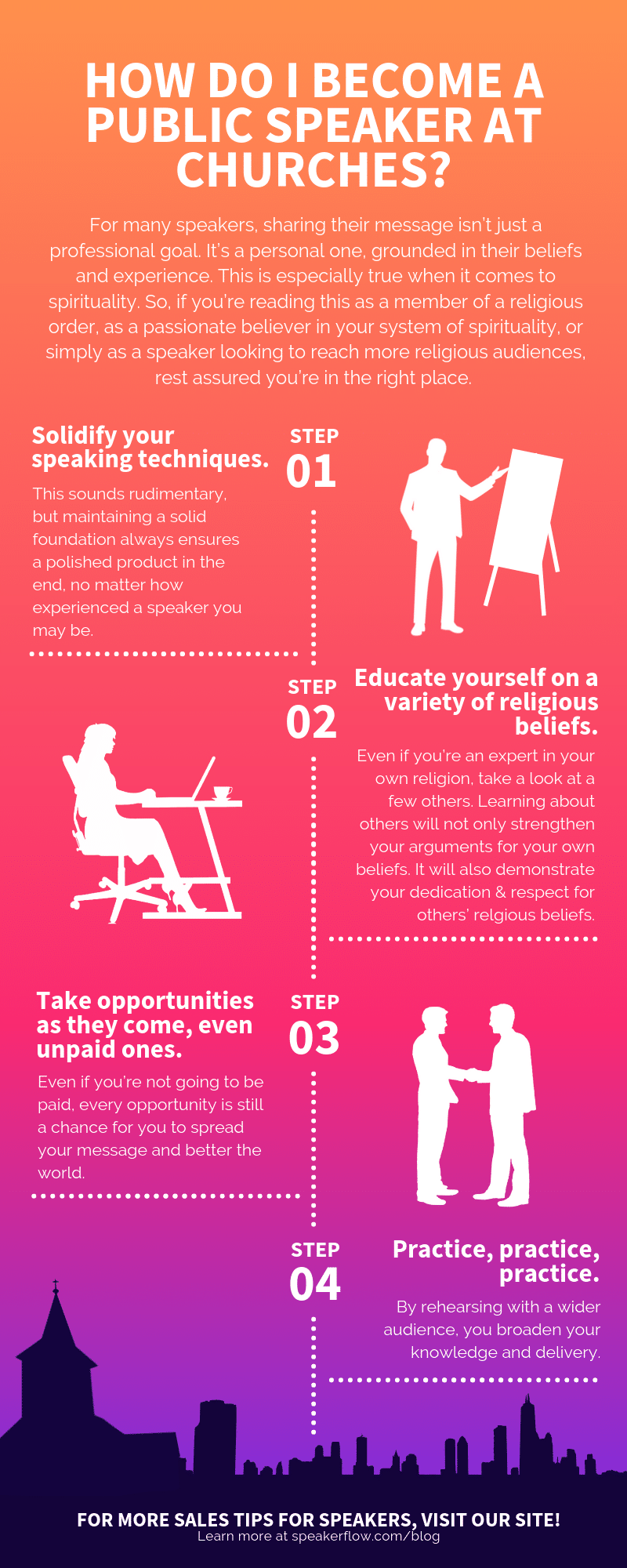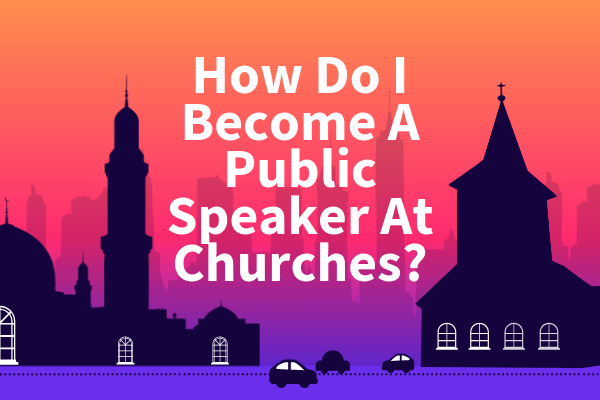For many speakers, sharing their message isn’t just a professional goal. It’s a personal one, grounded in their beliefs and experience. This is especially true when it comes to spirituality, as, for many, religion is the foundation for everything in life.
So, if you’re reading this as a member of a religious order, as a passionate believer in your system of spirituality, or simply as a speaker looking to reach more religious audiences, rest assured you’re in the right place.
Before we start, just a heads up that I’ll be using “church” as an umbrella term for religious gathering spaces. The last thing this guide is intended for is alienating any religion or belief system. If you feel, at the end of this, that your specific religion is under or misrepresented, feel free to drop us a line! We’re always looking to be the best we can be, and the SpeakerFlow blog is no exception. 👍
Now that that’s out of the way, let’s get started! Below are a few of the topics and questions we’re going to cover:
How do I become a speaker at churches?
First and foremost, becoming a speaker at churches depends on a few things more than anything else: your message, your audience, and your knowledge of the space. Your message is a fairly obvious one. It’s not really surprising that you want to be sure you are approaching churches that share the same fundamental views that you generally promote in your speeches. The last thing you want to do is contradict your message from past speaking gigs, especially if you want the opportunity to speak at a single church more than once.
Checking your audience, online and offline, is another important piece in becoming a speaker at churches. Make sure that your digital presence is in accordance with the guidelines of your target religion. For example, if you’re hoping to speak in Christian institutions, maybe steer clear of profanity in your social media posts. In the end, you want your audience in church to match your audience at any other event and your audience in the digital world. Check out this brief religious audience analysis guide from ChurchMag.ag if you’re unsure where to start.
That said, if you’re not sure if your message or persona is ideal for a specific religious setting, do some research! All of us can use a little brushing up from time to time about the thousands of belief systems out there. Even if you don’t personally share the beliefs of the churches in which you want to speak, respect and knowledge of the space can make you a valuable source of perspective.
But, enough about the basics. Let’s jump into some concrete steps to get started as a speaker in churches.
Church Guest Speaker Checklist
Depending on the religion or belief system that you’re looking to engage, the steps for becoming a consistent speaker in churches may vary. However, the same principles apply beneath the process, regardless of the path you choose. Let’s break them down one at a time.
1. Solidify your speaking techniques.
Before anything else, make sure you have your presentation style and your general message nailed down completely. Take some time to also refresh yourself with tips and tricks for public speaking. This sounds rudimentary, but maintaining a solid foundation always ensures a polished product in the end, no matter how experienced a speaker you may be.
2. Educate yourself on a variety of religious beliefs.

Next, once your speaking skills are freshened up, turn your attention to the entire focus of being a speaker in churches: the spirituality. Even if you’re an expert in the belief system on which you plan to focus, take a look at a few others. Learning more about the alternatives will not only strengthen your arguments for your own beliefs. It will also demonstrate your dedication to spirituality as a topic and your respect for others’ claims in the religious arena.
Not sure where to start? To begin, there are tons of great resources out there for learning the fundamentals of different recognized religions, including the Vatican website for an intro to Catholicism and JewFAQ.org for Judaism 101. My personal favorite (and the most comprehensive guide I’ve come across) is the Virtual Religion Index, maintained by Professor Mahlon H. Smith at Rutgers University. This digital dictionary of beliefs is the perfect place to start for anyone new to religious speaker or simply looking to broaden their spiritual horizons.
3. Take opportunities as they come, even if they’re unpaid.
Third, as a new speaker in churches, take every opportunity you get, regardless of whether or not you’ll be monetarily compensated. With any industry, you have to run before you can walk, the speaking industry included. Even if you’re not going to be paid, every opportunity is a chance for you to spread your message and better the world. We’ll go over some tools for finding speaking gigs in churches in just a moment.
4. Practice, practice, practice.
Finally, and this goes without saying, but practice as much as you can. Run your presentation by religious professionals in your church or in front of members of different religions, if you’re able. Get as many opinions and viewpoints as you can. By rehearsing with a wider audience, you broaden your reach into the realm of spiritual speaking on top of ensuring rock solid delivery of your message.
Tools for Finding Speaking Gigs at Churches
Now, for the good part: how to find gigs as a speaker in churches. There are countless tools for finding church gigs, but some of the most useful are online directories for religious institutions. For Christian speakers, these include ChurchFinder.com and USAChurches.org, among others. For Jewish speakers, MavenChurch.com’s database of synagogues is a great starting point. Other digital search tools, such as the Speaker Intel Engine, provide affordable and efficient ways to search for speaking gigs within your industry or religious niche strictly through Google.
On the flip side, you can also approach religious audiences at a younger age through religious colleges and universities. To start with, TopChristianColleges.org is another awesome tool for Christian speakers. Additionally, InternationalStudent.com boasts a regularly-updated list of religiously affiliated colleges in the United States. Check out our other blog, “How Do I Become A Public Speaker At Colleges & Universities?” for information about speaking strictly in higher education.
Last but not least, some of the greatest speaking opportunities, especially in the world of spirituality, can come from your local religious organizations. Not sure how to approach a religious audience? Confused about how to get started with some of these steps? Contact local religious establishments and ask them for some advice. As much as I can pull together facts and digital tools to help you become a speaker in churches, the men and women already active in religious centers can provide real-world tools and encouragement to help you hit the ground running.
Top Spiritual Speakers on YouTube
If you’re already working on becoming a speaker in churches or are simply looking for some spiritual inspiration, this next section is for you. Below are five of the SpeakerFlow team’s favorite YouTube videos on the topic of religion and spirituality.
You may also notice that they’re all TED Talks, one of my favorite sources of speaking inspiration. If you haven’t heard of TED before, feel free to check out our previous blog, “What Is A TED Talk? The Fundamentals of TED Explained”. Spoiler alert – they’re pretty great. 👌
“Why the only future worth building includes everyone” by Pope Francis
Whether you’re a member of the Catholic church or not, you’ve likely heard of Pope Francis by now. Known for his approachableness and humility, the Pope’s TED talk is a screenshot of his attitude towards humanity, Catholicism, and the papacy. Here, he says, “Let us help each other, all together, to remember that the ‘other’ is not a statistic or a number. We all need each other.” Click below to hear more.
“Responding to Pastor Rick Warren” by Dan Dennett
In this TED talk, religion and spirituality are explained in conjunction with other arguments rather than presented as a standalone view of morality. Here, Tufts University professor Daniel C. Dennett takes on evangelical Christian pastor Rick Warren’s argument that morality depends on rejection of evolution and states that all religions must be taught in schools in order for future generations to “understand its nature as a natural phenomenon”. Check it out to hear more about his research in cognitive studies and his take on religious education.
“What Islam really says about women” by Alaa Murabit
A gem for feminists and religious speakers alike, physician and activist Alaa Murabit is a prime example of how to speak in religious and non-religious contexts while maintaining a cohesive brand. In this TED talk, Dr. Murabit explains her experience as a Muslim woman as well as her use of Koran verses in campaigning for women’s rights. If you’re reading this looking to speak in religious circles in addition to your current industry, the video below is some serious inspiration.
“Atheism 2.0” by Alain de Botton
Taking a step back for a minute, one of the belief systems I have yet to mention is atheism. In the video below, British philosopher Alain de Botton tackles this topic with ease. Here, he “suggests a ‘religion for atheists’… that incorporates religious forms and traditions to satisfy our human need for connection, ritual and transcendence”. Click below to see his arguments for yourself.
“The habits of happiness” by Matthieu Ricard
Finally, last but not least is a TED talk from Buddhist monk, photographer and author Matthieu Ricard from 2008. With over two million views, Ricard’s presentation focuses on the intersection of faith and science. In it, he explains the support each area can provide as we seek happiness throughout our lives. Although it’s one of the longer videos included here, it’s definitely worth watching.
Other Frequently Asked Questions
What is a spiritual speaker?

Spiritual speakers are individuals that speak on topics generally pertaining to religion or spiritual beliefs. In the context of this blog, anyone wishing to be a speaker at churches is, by definition, a spiritual speaker, as their content will likely touch on the beliefs of their church in one way or another.
Some famous spiritual speakers include Baptist minister and social activist Dr. Martin Luther King, Jr. and the current and 14th Dalai Lama of Tibet. Additional examples include televangelist and pastor Joel Osteen and Catholic cardinal and archbishop of Washington Donald Wuerl.
What do speakers at churches generally talk about?
Speakers at churches may choose to present on any number of topics. However, the cornerstone of the presentation will likely be the religious denomination to which he or she is presenting. For example, in speaking to a group of Buddhists, you may touch on the founder of Buddhism, Buddha Shakyamuni, first. After that, you could branch into how to bring the primary goals – kindness, inner peace, and wisdom – into the hustle of our modern world.
The extent to which you want to focus on your religious beliefs depends entirely on you and your audience. As long as your message and brand are in sync with your audience and their expectations, there’s room for flexibility. That way, you can demonstrate your passion for your beliefs while still being yourself and showcasing your other areas of expertise.
How much do church guest speakers make?
Depending on the size, location, and denomination of the church, speakers in churches can make anywhere from thousands of dollars to nothing at all (at least not in a monetary sense).
A good rule of thumb is to consult the church decision maker directly prior to your event. Because of their tax status, many churches are restricted by the Internal Revenue Service in terms of what costs they can cover for guest speakers. For some basic information, check out ChurchPlants.com’s breakdown of payments for guest speakers at churches. Although it’s still always a good idea to work with your church’s staff or guest event planner directly, this set of guidelines provides a view of church speaking from a staff perspective and some preliminary questions you can take to book your next church speaking gig.






